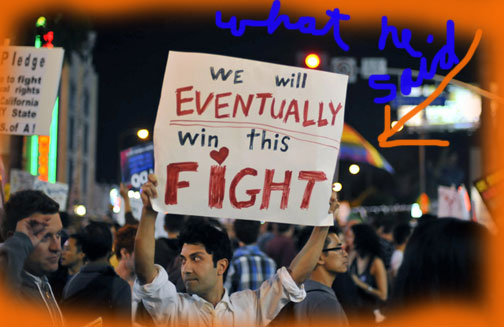
In answer to the above question…..it’s complicated.
However, before we discuss the implications of Tuesday’s California Supreme Court hearing, here’s what the LA Times and the NY Times reported on the basic facts of the matter.
First the LA Times:
The California Supreme Court appeared ready Tuesday to rule that the backers of Proposition 8 and other ballot measures have the right to defend them in court, a stance that would give opponents of same-sex marriage the chance to champion the initiative all the way to the U.S. Supreme Court.
During an hour of oral arguments, several justices appeared skeptical that only elected state officials may defend measures passed by voters, as gay-rights lawyers claimed.
If that were the case, same-sex marriages would resume in California because Gov. Jerry Brown and Atty. Gen. Kamala D. Harris have refused to appeal last year’s federal ruling against Proposition 8.
Justice Ming W. Chin observed that the power of the people to enact laws would be curtailed if initiatives could be blocked in court every time officials refused to defend them.
“So the attorney general and the governor get to pick the laws they want to enforce?” asked Chin, a conservative on the court.
Justice Joyce L. Kennard, one of the court’s more liberal members, appeared to agree. Denying initiative sponsors the right to appeal, she said, would be “nullifying the great power that the people have reserved for themselves” and “would not promote principles of fundamental fairness….”
Now the NY Times:
In a hearing that suggested no quick resolution to the long-contested legal battle over Proposition 8, the same-sex marriage ban in California, several members of the state’s highest court seemed skeptical of arguments on Tuesday that the measure’s supporters should not have a chance to defend it in federal court.
The hearing, at California Supreme Court here, came at the behest of a three-judge panel of the United States Court of Appeals for the Ninth Circuit, which is reviewing a 2010 decision by a federal judge who found Proposition 8 to be unconstitutional.
The appellate court had asked the state court if the backers of Proposition 8 had legal standing under California law to defend the measure, because both the current and previous governors and attorneys general of California have repeatedly refused to argue for it. Opponents of the measure say that without standing, there is no case, something that could mean a resumption of same-sex marriage in the state, where it was briefly legal in 2008.
But while no decisions were issued at the hearing on Tuesday — the seven-member Supreme Court has 90 days to do so — there were indications that several California justices were wary of finding that supporters of Proposition 8 had no right to defend the measure…..
Now here’s where it gets complicated: If the California Supremes rule that the Prop 8 defenders have no official right—-aka legal standing— to challenge Judge Vaughn Walker’s findings that Proposition 8 is unconstitutional, that will be good news for all who favor equality—at least in the short-run—because marriage for same sex couples will become instantly legal in the state of California.
Yet, while California will have won the battle, the larger precedent-setting war will have been lost, at least in the short run, because that will mean there will be no Supreme Court challenge to Prop 8.
Of course, if the Prop 8 case goes to SCOTUS, it’s a roll of the dice. The Constitutional law dream team of Ted Olson and David Boies could lose, while a “no standing” decision gives them an instant victory in California.
However, if standing is established, and the case goes from the 9th Circuit to the Supreme Court, and if the US Supremes rule in favor of Prop 8 challengers Olson and Boies….. that, ladies and gentlemen, is the ball game. Equality will become the law of the land.
NOTE: Just got back. Back fully in biz tomorrow.

It also means that the will of the people, as shown through the initiative vote, will have been overruled. Perhaps in a few years a conservative administration will refuse to enforce propositions you are in favor of.
At that point, perhaps, you will reconsider your anti-democratic stance.
We all need to play by the rules, even if we don’t favor the outcome. That’s at the heart of American democracy.
Will of the people. lol. This was the will of a well funded religious establishment in Utah. Make no mistake. Prop 8 was not the voice of California. It was the voice of Utah’s Mormon church. Most funding for prop 8’s campaign came from Utah.
There’s an awful lot of *gray* in the initiative process. It’s an inherited risk of being a ballot proponent that elected state officials might not defend a measure, no matter how popular, even if it passes. It’s akin to demanding a Baptist be a Catholic.
The proponents of prop 8 may have walked themselves right into a trap. I’d love to see what sort of legal council they sought and followed (or didn’t follow) prior to when they originally filed the initiative with the state.